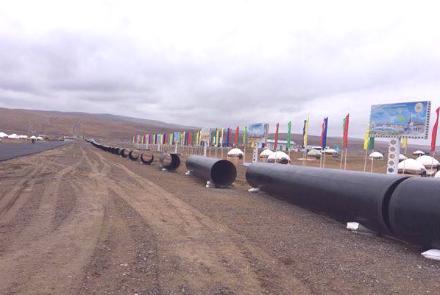Officials of the Turkmenistan-Afghanistan-Pakistan-India (TAPI) gas pipeline project in the country said so far they have completed 45 percent of the land acquisition process of the project in five provinces.
But the officials said the process is facing some problems.
They said an authoritative committee should be assigned to overcome the land acquisition problems along the planned route of the pipeline.
Work has started on TAPI project in five provinces, the officials said, but did not name the provinces.
The TAPI pipeline project was inaugurated by leaders of four countries in January 2016. The work on the Turkmenistan section of the project was completed in February and in that month, work on the Afghanistan section kicked off in Herat province in the west of the country.
“The project is very important in terms of income, the economy and employment opportunities for the people. We ask government to implement the project in its best form,” said Shabir Bashiri, an analyst in economic affairs.
The 1,814-kilometer gas pipeline will pass through Afghanistan to Pakistan and India. At least 816 kilometers of the pipeline will pass through the territory of Afghanistan.
The pipeline passes through Herat, Farah, Nimroz, Helmand and Kandahar provinces of Afghanistan.
In Afghanistan, the TAPI pipeline will be constructed alongside the Kandahar–Herat Highway in western Afghanistan, and then via Quetta and Multan in Pakistan.
The final destination of the pipeline will be the Indian town of Fazilka, near its border with Pakistan.
The project will cost $22.5 billion.
The project will be completed by 2019, according to President Ashraf Ghani’s Office.
The project is implemented by the TAPI Limited Company – a group of firms from Afghanistan and Turkmenistan including Afghan Gas Enterprise, Turkmen Gas State Company, and two private companies from Afghanistan.
Afghanistan’s Share From TAPI
Afghanistan is expected to earn more than $400 million in transit duties annually from the project.
According to Ghani’s office, the project will create thousands of job opportunities for Afghans.
Afghanistan will annually get 500 million cubic meters of gas from the project in the first ten years. The amount will increase to one billion cubic meters of gas in the following ten years and 1.5 billion cubic meters of gas in the third 10 years after the completion of the project.
Other Projects Included In TAPI
The TAPI project was recently changed into a collective of other projects which will be implemented alongside this key initiative for Afghanistan.
The Turkmenistan-Afghanistan-Pakistan 500 kilovolts Line (TAP-500) will transfer Turkmenistan’s electricity to Pakistan through Afghanistan.
According to Ghani’s office, Afghanistan is expected to earn $110 million annually from the TAP project.
During this period, three substations of power will be established in Herat, Farah and Kandahar provinces of Afghanistan.
An optic fiber will also connect regional and neighboring countries under the TAPI project, Ghani’s office said.
Another major part of the project is the national and regional railway which connects Pakistan and Turkmenistan through Afghanistan.
Meanwhile, the 13-kilometer railway of Torghundi Port of Afghanistan will be reconstructed by Turkmenistan. This project will cost $10.5 million.


